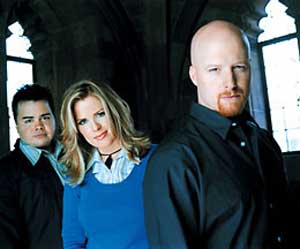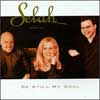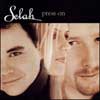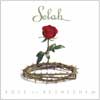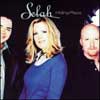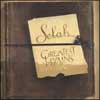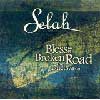Selah
Genre: Pop/Worship
Official Web Site
Selah Bibliography: (click on each album cover to view tracks and Selah lyrics)
Selah Biography These are the paradoxes of Selah.
Three gifted young musicians-a brother and sister brought up in the African heartland, a Tennessee native who had barely set foot outside of his home state-united now as one voice raised in praise to God.
A stream of successes-five Dove Awards, two #1 Inspirational radio singles and five Top 10 hits, enthusiastic receptions at venues ranging from "The 700 Club" to Carnegie Hall-that began almost by accident and built into a Christian music phenomenon.
A new album, Hiding Place, on which the group intermingles Congolese, Irish, R&B and pop melodies alongside hymns and worship songs into what has now become known as the "Selah sound."
Finally, there's the name itself: Drawn from the Psalms of David, selah suggests taking the time to pause and reflect, even as their music invites you to immerse yourself in the joy that it conveys.
Yet Selah-Nicol Sponberg, Todd Smith, and Allan Hall-have only begun their journey.
Returning with Hiding Place, their fourth offering to date, Selah again successfully melds the many musical flavors that have personally influenced each member into a diverse, yet cohesive collection. Produced by Jason Kyle and Selah, Gospel favorites like "Power In The Blood," the Irish melody "You Raise Me Up," the African pulse of both "Esengo" and "By and By," the pop feel of "All My Praise" and the contemplative "The Deep, Deep Love Of Jesus," among other selections, are woven into a single statement of faith that communicates with urgent power.
To those who have followed the group over time, Hiding Place affirms the music and mission of Selah even while charting new territory. Specifically, the group's interpolations of familiar hymns alternate with songs that deliver an edgier, more contemporary sound-a direction that might be credited largely to Todd.
"That's more my style," he admits. "You have songs like 'All My Praise' and 'The Deep, Deep Love Of Jesus,' which build up and convey more intensity than much of what we've done before. But then you have very simple songs like 'Hiding Place' and 'Before The Throne of God,' which is lyrically one of the strongest hymns I've ever heard. We always do an African song on our album, and for this project we have two, both of which have a fun, up-tempo vibe. And we also really enjoyed bringing a rock and R&B feel to the old spiritual 'Power In The Blood.'"
"What it comes down to is that we have a lot of variety on Hiding Place," Allan adds. "I love taking people on a journey. And if that makes us harder to categorize, well, that's great. I love it that we do all kinds of music and can't be so easily pegged."
The uniqueness that has made Selah's sound so hard to pinpoint originated in two vastly different locations-central Africa and East Tennessee. Jim Smith, in resuming his own father's ministry, took his family to a life of missionary work in the Congo. The Smith children, Todd, Nicol, and their two other siblings grew to see the world as a place of trees-mango, palm and coconut-many planted by their grandmother, circled around their outpost home. They'd wake up each morning to the crackle of the CB radio, as their parents touched base with other missionaries scattered through the veldt.
They came to know the Congolese people, to speak their Kituba language and love their music. Some resisted their message, yet the Smith family persisted, singing and preaching, even assisting during operations in hospitals, learning far more about life than most children their age.
"Our dad drove a seven-ton army truck, the only kind that would make it on those muddy roads in the rainy season," Nicol remembers. "We'd have to cross these bridges made of six planks, 40 feet above the river, and we'd always pray that the planks wouldn't break under the truck. That's what life was like there: You had to pray-just to survive."
At the same time, in Knoxville, Tennessee, thousands of miles from these adventures, Allan Hall woke up to a different landscape each day. Like his future colleagues in Selah, he built his life on faith-in his case, symbolized by two compelling images: the Grigsby United Methodist Chapel, an old whitewashed building shaded by a sprawling oak and abutted by a cemetery of former parishioners, and a dusty upright piano hidden in the basement of his house.
Allan's parents bought the instrument when he began showing interest in playing; at age 7 he started learning melodies and chords from the pianists who played at the church. Spending hours there and at the keyboard back home, he learned to read music from church hymnals and developed his ear by playing from his heart. Ten years would pass before he had his first formal lesson, and by then he had already become an experienced musician, as accompanist to the high school choir beginning when he was just in seventh grade. His piano teacher, a strict Italian emigre, found his self-taught technique severely flawed-yet something in his playing won her attention.
Their work culminated in her decision to enroll him in a piano competition near Nashville. There, surrounded by rivals who had been drilled on a classical regimen since age 2, Allan felt like a drowning man in a pool filled with piranhas. Yet he fought down his panic, played his selections of Debussy, Beethoven, and Bach, and then awaited the verdict.
"I actually won first prize," Allan recalls. "All of the judges said that I needed technical development, but yet they also said I had moved them. One judge wrote, 'I've been dazzled a lot by technique today, but no one playing today made me feel anything until you came to play. I can hear your heart.' I've clung to those words. There are far better players than me, but from that day I've known that I can connect with people through my playing and singing."
Each prepared in his or her own way, the three young artists set off on paths that would soon bring them together. Allan followed his dreams by studying music at Nashville's Belmont University. Nicol, meanwhile, entered Wheaton College in Illinois as a French language and literature major. A friend there told her about the music business program at Belmont, and she passed the information along to her younger brother Todd, who had decided to set aside his earlier ambitions to follow his grandfather and father's footsteps and pursue missionary work himself. With his family's blessing, he arrived at Belmont, where a new world of sound and ideas presented itself.
"I loved Jesus and believed in Him fully, but I was going through a time when I didn't want anything to do with going to a regular church," Todd says. "I really wanted to do more secular music. I was a big fan of groups like Boston and Kansas and Toto, but I was also drawn to Russ Taff, Andrae Crouch, Bob Carlisle and the Allies, and Matthew Ward, and after a while I came back to the fact that I really did want to sing about the Lord."
Allan and Todd met during a recording session for a mutual friend. When Allan's pastor asked him to organize the music at a worship service one weekend when he would be out of town, Todd accepted the invitation to join him for the service. Then, feeling that he'd like to augment their duo vocals, Todd invited his sister to make it a trio. Nicol had been developing her own solo material, but when she, in turn, was offered an opportunity to perform at a youth concert, she decided to ask Todd and Allan to take part too.
Already their direction was clear. All three had grown up in a tradition of singing hymns, and they found that in presenting these songs they connected in every way-musically, spiritually and emotionally. Rev. Smith and his wife sensed it too; after hearing the new group's second performance, they gave the kids $2000 to record some tracks. They did so, not thinking of their effort with any sense of professional aspiration.
Still, when the tape fell into the hands of Curb Records, the label liked it enough to release it as an album. Its appeal to every age group, its understated yet electrifying treatment of familiar and forgotten hymns, made it a unique release in 1999. Be Still My Soul earned the group its first Dove Award for Inspirational Album of the Year, and with that a new phenomenon took flight.
Their sophomore release in 2001, Press On, became Selah's second consecutive Dove Award-winning CD for Inspirational Album of the Year, and the project also produced two number one singles, the title cut and "Wonderful, Merciful Savior." Following-up with 2002's Rose of Bethlehem, Selah brought their signature style to a Christmas recording.
In addition to this year's Hiding Place, all three members of Selah will be releasing solo projects in the months to come, delving deeper into the individual musical tastes the three bring to the group. Their road may have begun separately in Africa and Tennessee, and it may split on occasion in individual directions, but Hiding Place makes it clear that Selah will endure.
"When you need to be comforted, there is nothing like these hymns, because so many of them were written from a place of suffering," Nicol states. "We hope this record will soften everyone's hearts to worship. God is just waiting for us to take that first step to draw near to Him, and these great songs can lead people to the source of comfort and strength."
|


